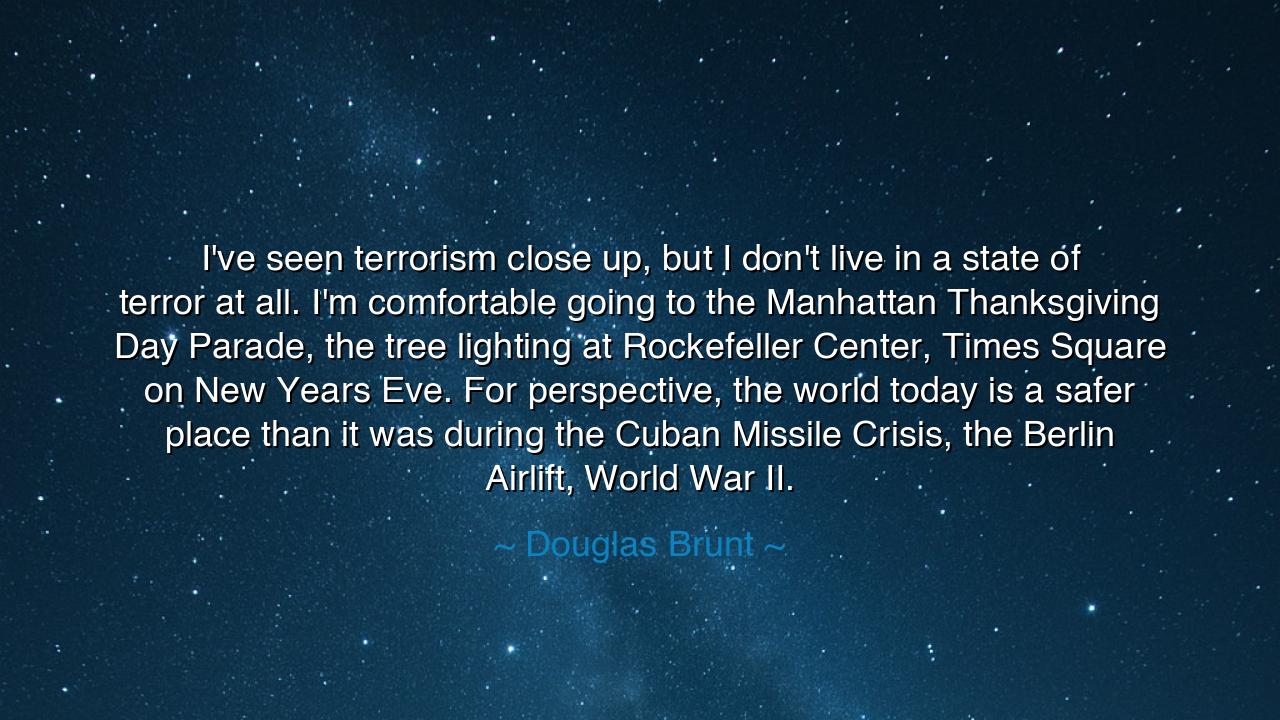
I've seen terrorism close up, but I don't live in a state of
I've seen terrorism close up, but I don't live in a state of terror at all. I'm comfortable going to the Manhattan Thanksgiving Day Parade, the tree lighting at Rockefeller Center, Times Square on New Years Eve. For perspective, the world today is a safer place than it was during the Cuban Missile Crisis, the Berlin Airlift, World War II.






"I've seen terrorism close up, but I don't live in a state of terror at all. I'm comfortable going to the Manhattan Thanksgiving Day Parade, the tree lighting at Rockefeller Center, Times Square on New Years Eve. For perspective, the world today is a safer place than it was during the Cuban Missile Crisis, the Berlin Airlift, World War II." With these words, Douglas Brunt offers not merely a reflection, but a declaration of courage and perspective. He speaks as one who has looked into the eyes of fear, yet chosen not to let fear rule his life. His testimony reminds us that to live fully, one must not surrender to the shadow of dread, but must stand firm, walking boldly among the gatherings of men and women, choosing joy and presence over retreat.
The origin of this quote lies in the modern age, when acts of terrorism have scarred cities and unsettled hearts. Many respond by withdrawing, living in suspicion, and allowing fear to dictate their movements. But Brunt places these fears within the wider perspective of history. He recalls the terrifying brink of annihilation during the Cuban Missile Crisis, when the world teetered on the edge of nuclear war. He evokes the Berlin Airlift, when an entire city was sustained under threat of Soviet blockade. He looks back to the global fires of World War II, when destruction stretched across continents. By placing today’s troubles beside these cataclysms, he shows us that our age, though unsettled, is not the darkest of ages.
History itself gives us a great story: in October 1962, during the Cuban Missile Crisis, ordinary people in America awoke each day uncertain whether they would live to see another dawn. Shelters were dug, maps of fallout zones studied, and leaders held their breath as the fate of the earth lay balanced on decisions made in hours. Compare this with today, when despite acts of terror, children still laugh at parades, lights still blaze in city squares, and people gather without the constant expectation of annihilation. Brunt’s words recall this reality: that we must weigh fear against history, and understand that our lives, though fragile, exist in a time less perilous than many before us endured.
To live without terror is not to deny danger, but to refuse to bow before it. The ancients knew this truth: that courage is not the absence of fear, but the triumph over it. A warrior may tremble, but he lifts his spear and steps forward into the line of battle. A mother may fear for her child, but she walks on, sustaining life in harsh lands. Brunt speaks in this same spirit, urging us to walk through the crowded streets, to partake in the festivals of light, to gather together even when the whispers of fear beckon us to remain hidden.
The wisdom here is clear: fear magnified becomes its own enemy, greater than the danger itself. To let terror govern our days is to grant victory to those who wield it. But to live fully, to rejoice in life’s gatherings—whether at the Thanksgiving Day Parade, beneath the Rockefeller tree, or in the throngs of Times Square—is to claim victory for the human spirit. In such acts, ordinary though they may seem, lies defiance as powerful as any army.
Thus, the teaching to future generations is simple yet profound: do not let the age deceive you into thinking it is the darkest of times. The shadow of history reveals that mankind has walked through greater storms and survived. Your task is not to shrink into corners, but to carry forward the flame of courage. Walk among others, sing the songs of joy, lift your eyes to the lights of celebration, and know that by doing so you defeat fear at its root.
Practical action follows: cultivate perspective in your heart. When fear whispers, remember the crises endured by your ancestors, and draw strength from their endurance. Choose not isolation, but community. Gather at the feasts, the parades, the celebrations of your time. Stand firm in the knowledge that life is meant to be lived, not hidden. In this way, you will honor the past, defy fear, and pass on to those who come after you the wisdom of a life lived with courage rather than trembling.
And so the voice of Brunt echoes like the voices of the ancients: live not in terror, but in thankfulness and boldness, for though danger always exists, the true strength of man is not in avoiding it, but in walking through it unbowed.






AAdministratorAdministrator
Welcome, honored guests. Please leave a comment, we will respond soon